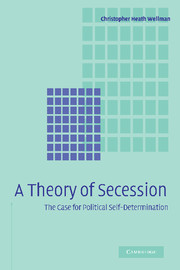Book contents
4 - Lincoln on Secession
Published online by Cambridge University Press: 18 July 2009
Summary
A theory of secession as permissive as that which I advanced in the previous chapter is bound to be met with various objections as well as with questions about its implications for actual, real-world secessionist conflicts. Both of these issues can in large measure be addressed by critically reviewing Abraham Lincoln's arguments against the South's bid for independence. Lincoln is not typically heralded for his political theory, but his arguments on secession deserve careful attention not only because he was an exceptionally reflective principal in what was arguably history's most spectacular, protracted secessionist conflict, but also because (descendents of) his arguments continue to be influential. With this in mind, I divide this chapter into four sections. First I review Lincoln's ten arguments against secession. Next, I explain why none of these arguments is adequate. In the third section, I illustrate how the functional theory of secession actually points the way toward a better justification for Lincoln's Unionist stance. Finally, I quickly sketch how the functional account would adjudicate several other prominent secessionist conflicts.
Lincoln's Case against State Breaking
History records Lincoln as one of America's great political figures. He is commonly not, however, listed among the pantheon of leading philosophical lights. Although he arguably gave an unprecedented amount of sustained attention to the ethics of state breaking, his public arguments on the topic make no strong case for revising history's assessment of him.
- Type
- Chapter
- Information
- A Theory of Secession , pp. 65 - 96Publisher: Cambridge University PressPrint publication year: 2005



